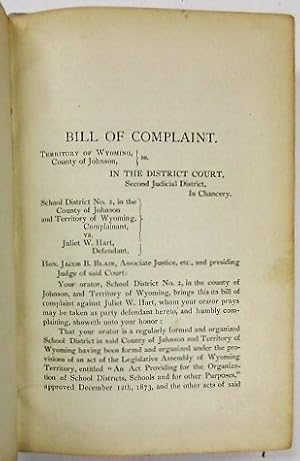About this Item
Four documents: 227, [1]; 23, [1 blank]; 220, [3 folding, contemporary typed index leaves]; 32 pp. The first document consists of the Bill of Complaint, the Answer and other court documents, testimony of witnesses; the second is the Brief for Appellant in the Wyoming Territorial Supreme Court; the third is the Record, filed in the Wyoming Supreme Court, of the proceedings in the lower court; the fourth document is the Brief for Appellee [with a bit of ink scribbling on the caption title]. Each of these separate imprints is in Very Good condition, bound together in contemporary sheep, rebacked. Johnson County is best known for the Johnson County War, a conflict [1889-1893] between big ranchers and little settlers that finally ended when President Benjamin Harrison intervened with the U.S. Cavalry. Verling Hart had qualified to acquire land in Johnson County under the Desert Land Act. With his verbal permission, relying on his verbal promise to convey the premises to the School District, the District built a school and other improvements on the property. Before formal conveyances could occur, however, Verling died. After his death the United States issued the title to Verling's estate. But his widow and executrix, Juliet, refused to acknowledge Verling's oral agreement or to perform the promises which the School District alleged Verling had made. Hence the School District initiated suit against Juliet, requesting the court to order the desired conveyance. The district court held in favor of Juliet. The school district appealed to the Wyoming Supreme Court, whose opinion is not printed here. That Court's decision, printed at 3 Wyo. 913 [1891], split the baby in a Solomonic opinion: Juliet could keep the property, because Verling's promises had been insufficiently specific to be enforced by the court; however, Juliet was required to compensate the School District for the improvements on the property. Verling Kersey Hart [1837-1883] was born in Indiana; in the 1860 census he is listed as living with his parents in Lee County, Iowa, and working as a clerk. Hart joined the 19th U.S. Infantry as a Captain in October, 1861, and was taken prisoner on September 20, 1863, during the Battle of Chickamauga. He was held as a prisoner of war in Columbia, South Carolina, for a over a year until he and several soldiers escaped in December, 1864, and made it to Union lines. He was later brevetted Major for gallantry at the battle. [Heitman, Francis B.: HISTORICAL REGISTER AND DICTIONARY OF THE UNITED STATES ARMY, FROM ITS ORGANIZATION, SEPTEMBER 29, 1789, TO MARCH 2, 1903. VOL. 1, PART 2. Page 506; and VOL. 2. PART 3. Page 24. University of California Libraries, Internet Archive; "Verling Kersey Hart Diary," MSA SC 5454 description, Maryland State Archives web site; Price, George: ACROSS THE CONTINENT WITH THE FIFTH CAVALRY. 1883. Page 307.]. Seller Inventory # 30579
Contact seller
Report this item
![]()
